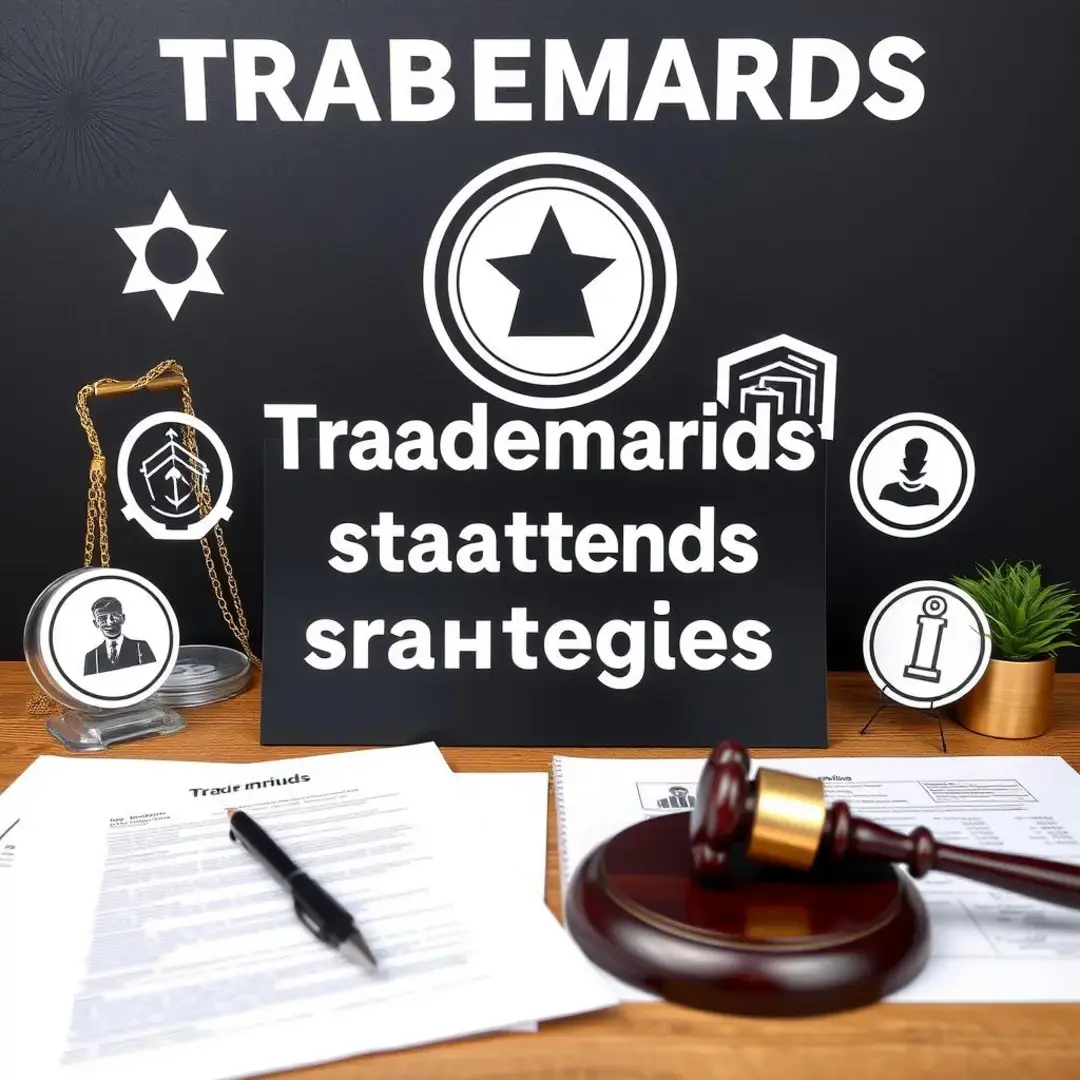Trademarking for Startups: Building and Protecting Your Brand
Advanced trademark strategies for startups

Developing a comprehensive trademark strategy
In the quickly evolving landscape of startups, the significance of a rigorous trademark strategy cannot be overstated. A comprehensive approach not only secures your brand identity but also lays a solid foundation for future growth. Start by identifying the core trademarks that will best represent your brand and resonate with your target audience.
Furthermore, an effective trademark strategy considers both current and potential future products and services. This forward-thinking method ensures that the trademarks protect innovations and expansions, making your brand resilient against competition.
Focusing on key products and services to trademark first allows startups to maximize protection where it matters most. This prioritization ensures that the essential aspects of the brand are safeguarded, providing peace of mind as the company grows. As your business evolves, you can then expand your trademark coverage to encompass new offerings.
Before filing for trademarks, conducting thorough searches is paramount. Advanced trademark searches go beyond simple database checks; they involve watching for similar marks, analyzing competitors, and understanding market nuances. This diligence helps avoid potential conflicts and paves the way for smoother registration processes.
Trademark watch services act as your watchdog in the crowded marketplace, monitoring new applications and potential infringements. By proactively tracking changes, you can respond swiftly, preserving your rights and maintaining your brand’s integrity. Such services are an investment in your brand’s long-term success and stability.
International trademark considerations for expanding startups
As your startup grows, international trademark protection becomes increasingly important. Navigating the complexities of trademarks in different jurisdictions can be a daunting endeavor, but understanding international treaties such as the Madrid Protocol can simplify this process. It provides a convenient way to extend your trademark protection across multiple countries with a single application.
The Madrid Protocol streamlines international registration into a manageable process, allowing startups to safeguard their trademarks in foreign markets effectively. This treaty significantly reduces costs and simplifies administration, making it an ideal solution for startups eyeing global expansion. Familiarizing yourself with this protocol can lead to more strategic international growth.
In addition to international treaties, startups need to be aware of specific regional trademark laws that may affect their business. Each region may have distinct requirements for trademark registration, filing fees, and enforcement mechanisms. Understanding these regulations is crucial to tailor your trademark strategy to local conditions, avoiding pitfalls that can arise from regulatory misunderstandings.
A robust global trademark portfolio strategy can enhance brand stability and recognition worldwide. This strategy should include regular assessments of your portfolio, ensuring that all trademarks remain relevant and protected as your business evolves. By mapping out a proactive approach, startups can efficiently manage their trademark assets on a global scale.
Protecting your trademark from infringement

Advanced tactics for enforcing trademark rights
Trademark infringement can pose a real threat to your startup, but comprehensive enforcement tactics can mitigate these risks. Awareness of your rights is the first step; from there, leveraging cease and desist letters can establish your claim and prompt faster resolutions to potential infringement issues. It’s essential to approach this with a clear understanding of negotiation strategies that could work to your advantage.
Cease and desist letters serve as both a warning and an official record of your claims. Drafting a clear and well-structured letter is crucial, as it reflects your seriousness about protecting your trademark. Skilled negotiation can lead not only to the cessation of infringement but also open doors to possible partnerships or licensing agreements.
Should negotiations fail, understanding the litigation process becomes vital. This process can be complex and drawn out, with implications for both time and financial resources. Partnering with experienced trademark attorneys will equip your startup with the expertise needed to navigate these challenges, ensuring you are well-informed every step of the way.
Trademark attorneys play a pivotal role in safeguarding your brand. Their expertise adds a layer of professionalism and knowledge when responding to infringements or guiding you through the registration process. Establishing a strong relationship with legal counsel provides reassurance and strategic support, crucial for startups facing potential trademark disputes.
Monitoring and addressing online trademark infringement
In today’s digital age, online trademark infringement is an increasing concern for startups. A significant portion of brand damages arises from misuse in online contexts, making it essential to monitor your brand’s presence actively. Utilizing digital tools such as brand monitoring software can help you detect unauthorized use early, allowing for timely intervention.
These tools and services automate the monitoring process, making it less labor-intensive for startups. By setting up alerts and tracking potential infringements, these technologies enable you to take swift action to protect your brand. Such proactive measures can deter future infringements and reinforce the strength of your trademark.
Social media presents a unique challenge regarding trademark infringement; it allows for rapid sharing and distribution of content. Initiating a strategy specifically for social media can equip your startup to tackle infringements effectively. Familiarizing yourself with platform-specific policies on reporting infringement will empower you to respond quickly and effectively.
As your brand gains recognition, it may become a target for counterfeiters. Implementing a strategy to combat counterfeit goods and services is crucial for protecting your brand’s reputation. Collaborating with e-commerce platforms to monitor listings and ensuring your consumers are educated about authentic products can significantly reduce the risk of counterfeiting.
Maximizing the value of your trademark portfolio

Leveraging trademarks for licensing and merchandising opportunities
Trademark licenses can open new revenue streams for startups, creating opportunities for collaborations that enhance brand visibility. By developing licensing agreements that clearly define how your trademarks can be used, you protect your brand while allowing others to leverage its value. This mutually beneficial arrangement can lead to greater brand exposure without the direct financial burdens of production.
A well-crafted licensing agreement outlines the terms of usage, ensuring your brand image remains intact. These agreements should cover royalties, quality control, and territorial limitations. Taking the time to develop a solid contract will ensure that your brand’s reputation is preserved, providing clarity for both parties involved.
Maximizing revenue from trademark licensing requires strategic negotiation and market analysis. Understanding industry standards for royalties can provide leverage during negotiations. Additionally, being open to creative collaborations can lead to increased exposure and sales, driving higher royalty earnings while fortifying your market presence.
Building brand equity through strategic trademark management
A robust trademark management strategy can significantly enhance your brand equity over time. By consistently monitoring and updating your trademark portfolio, you not only protect your brand but also illustrate to customers that you value and invest in your intellectual property. This vigilance helps cultivate stronger brand recognition and customer loyalty.
Consistency in branding across platforms fosters trust and establishes a recognizable identity for your startup. By ensuring your trademark is used uniformly in all communications, marketing campaigns, and product presentations, you promote a coherent image that resonates with consumers. This strategy is essential for building lasting relationships with your audience.
Trademarks play a vital role in establishing your brand’s reputation. A strong trademark can trigger positive associations in consumers’ minds, leading to increased loyalty and word-of-mouth promotion. By actively managing your trademarks and promoting their significance, you enhance both recognition and the perceived value of your brand.
Preparing for potential trademark oppositions and cancellations
Despite careful planning and execution, startups must be prepared for the reality of trademark oppositions and cancellations. Having a robust defense strategy in place can make a significant difference should such challenges arise. Engaging legal counsel early can help you understand potential weaknesses and fortify your trademarks against opposition threats.
Preparing a defense strategy involves being proactive in monitoring for potential challenges and clarifying the use and significance of your trademark. Investing in legal support to analyze incoming challenges can provide valuable insights on how to navigate complex disputes. A strong defense enhances your overall brand resilience in a competitive marketplace.
Awareness of the opposition and cancellation processes can also arm your startup with the knowledge needed to respond efficiently. Familiarizing yourself with these mechanisms allows for strategic planning and timely action, ultimately reducing the risk of losing trademark rights. Legal expertise can guide you through the intricate procedures, ensuring you remain compliant and protected.
Having experienced legal counsel on your side during trademark disputes can be a game-changer. An attorney who specializes in trademark law can offer tailored advice, helping you understand the implications of your decisions. Their support is invaluable in navigating the complexities of trademark regulations, defending your brand, and ultimately ensuring its longevity.












